Vitamin D
Filters
-
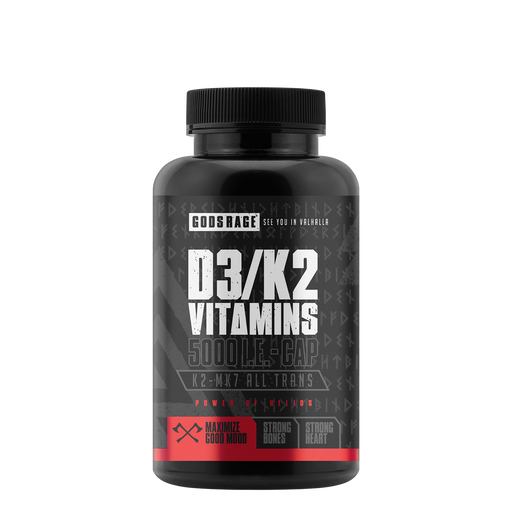 Sold out
Original price €19,90 - Original price €19,90Original price €19,90€19,90€19,90 - €19,90Current price €19,90| /
Sold out
Original price €19,90 - Original price €19,90Original price €19,90€19,90€19,90 - €19,90Current price €19,90| /D3/K2 Vitamins Gods Rage · 90 capsules
Gods Rage50 reviewsVitamin D3/K2 has a whole range of benefits for your health. Your immune system as well as your teeth, bones and muscles can all benefit from takin...
View full detailsOriginal price €19,90 - Original price €19,90Original price €19,90€19,90€19,90 - €19,90Current price €19,90| /Sold out -
 Save 0%
Save %
Original price €12,90 - Original price €12,90Original price €12,90€12,90€12,90 - €12,90Current price €12,90| /
Save 0%
Save %
Original price €12,90 - Original price €12,90Original price €12,90€12,90€12,90 - €12,90Current price €12,90| /Vitamin D3 5000IE · 60 capsules
GN Laboratories17 reviewsVitamin D3 can support your general well-being and health through a myriad of positive effects. Your immune system, the structure of your teeth and...
View full detailsOriginal price €12,90 - Original price €12,90Original price €12,90€12,90€12,90 - €12,90Current price €12,90| /Save 0% Save % -
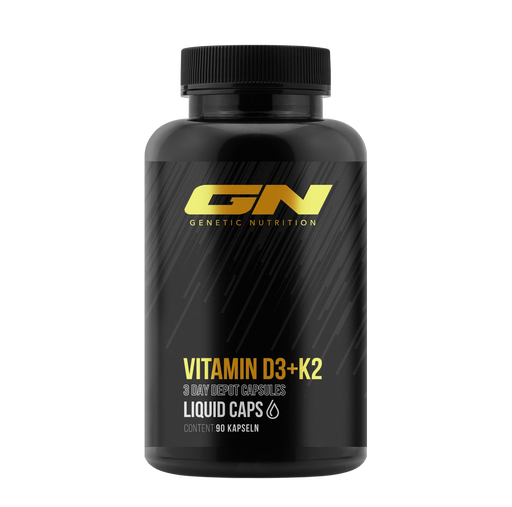 Save 0%
Save %
Original price €24,90 - Original price €24,90Original price €24,90€24,90€24,90 - €24,90Current price €24,90| /
Save 0%
Save %
Original price €24,90 - Original price €24,90Original price €24,90€24,90€24,90 - €24,90Current price €24,90| /Vitamin D3+K2 · 90 Liquid caps
GN Laboratories18 reviewsHighly effective combination: Vitamin D3+K2 Liquid caps from GN use vitamin D3 and branded raw material K2Vital® for optimum bone and dental heal...
View full detailsOriginal price €24,90 - Original price €24,90Original price €24,90€24,90€24,90 - €24,90Current price €24,90| /Save 0% Save % -
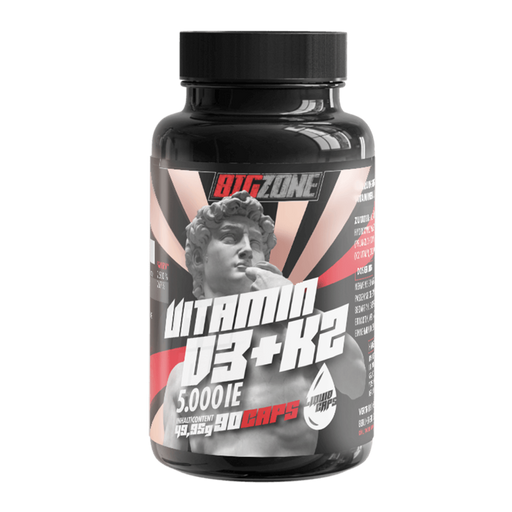 Save 0%
Save %
Original price €24,90 - Original price €24,90Original price €24,90€24,90€24,90 - €24,90Current price €24,90| /
Save 0%
Save %
Original price €24,90 - Original price €24,90Original price €24,90€24,90€24,90 - €24,90Current price €24,90| /Vitamin D3 + K2 · 90 Liquid Caps
Big Zone7 reviewsVitamin D contributes to the normal function of the immune system Vitamin D contributes to the maintenance of normal muscle function Vitamin D con...
View full detailsOriginal price €24,90 - Original price €24,90Original price €24,90€24,90€24,90 - €24,90Current price €24,90| /Save 0% Save % -
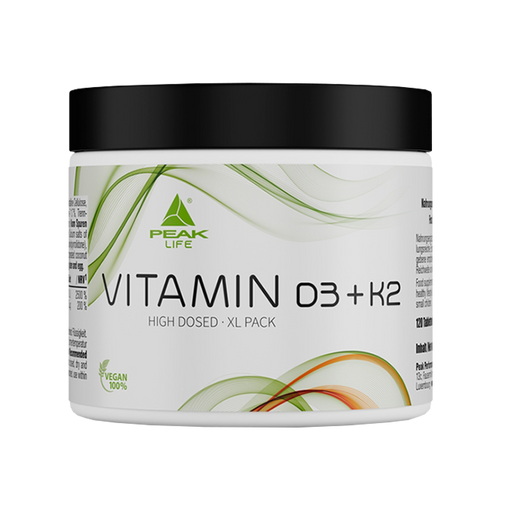 Sold out
Original price €19,90 - Original price €19,90Original price €19,90€19,90€19,90 - €19,90Current price €19,90| /
Sold out
Original price €19,90 - Original price €19,90Original price €19,90€19,90€19,90 - €19,90Current price €19,90| /Vitamin D3 + K2 · 120 tablets
PEAK6 reviewsVitamin D3 + K2 - important for bones, immune system and muscles High dosage 5000 I.U. (125 µg) vitamin D + 150 µg vitamin K per tablet High bioav...
View full detailsOriginal price €19,90 - Original price €19,90Original price €19,90€19,90€19,90 - €19,90Current price €19,90| /Sold out -
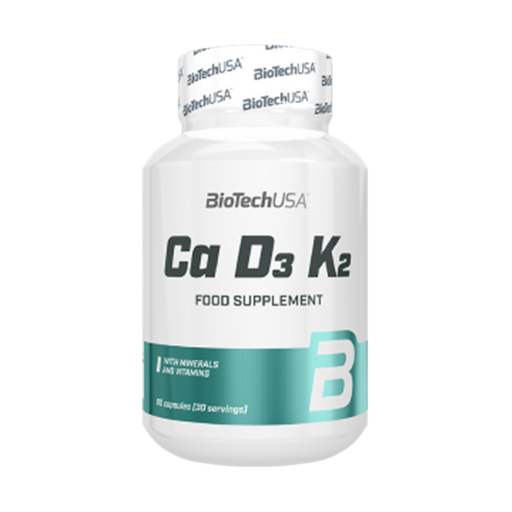 Save 11%
Save %
Original price €11,90Original price €11,90 - Original price €11,90Original price €11,90Current price €10,59€10,59 - €10,59Current price €10,59| /
Save 11%
Save %
Original price €11,90Original price €11,90 - Original price €11,90Original price €11,90Current price €10,59€10,59 - €10,59Current price €10,59| /Ca-D3-K2 · 90 capsules
Biotech USA3 reviewsComplex composition with calcium, phosphorus, vitamin D3 and vitamin K2 Economical packaging Easy to use Calcium for the maintenance of normal bon...
View full detailsOriginal price €11,90Original price €11,90 - Original price €11,90Original price €11,90Current price €10,59€10,59 - €10,59Current price €10,59| /Save 11% Save % -
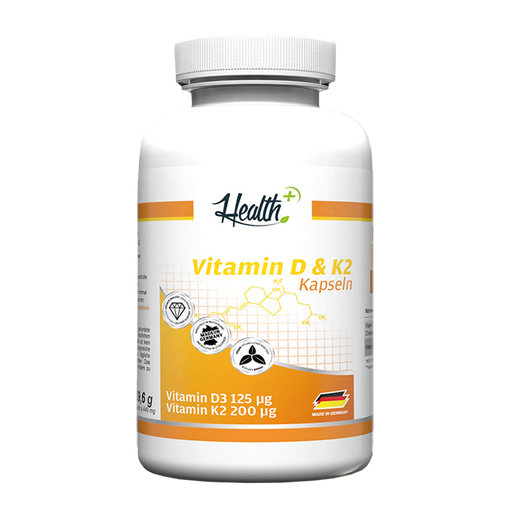 Save 0%
Save %
Original price €19,90 - Original price €19,90Original price €19,90€19,90€19,90 - €19,90Current price €19,90| /
Save 0%
Save %
Original price €19,90 - Original price €19,90Original price €19,90€19,90€19,90 - €19,90Current price €19,90| /Vitamin D3 & K2 Health+ · 90 capsules
Zec+2 reviewsSynergistic combination: HEALTH+ Vitamin D3 & K2 capsules provide comprehensive health benefits through the effective combination of 5000 IU ...
View full detailsOriginal price €19,90 - Original price €19,90Original price €19,90€19,90€19,90 - €19,90Current price €19,90| /Save 0% Save % -
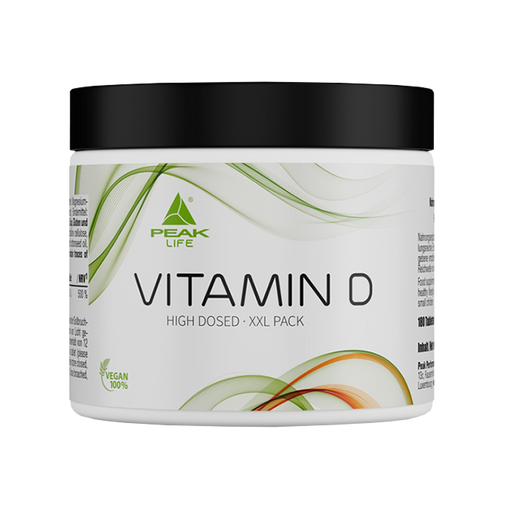 Save 0%
Save %
Original price €9,90 - Original price €9,90Original price €9,90€9,90€9,90 - €9,90Current price €9,90| /
Save 0%
Save %
Original price €9,90 - Original price €9,90Original price €9,90€9,90€9,90 - €9,90Current price €9,90| /Vitamin D · 180 tablets
PEAK3 reviewsVitamin D3 - important for bones, immune system and muscles 2000 I.U. highly bioavailable vitamin D3 per tablet Promotes the maintenance of normal...
View full detailsOriginal price €9,90 - Original price €9,90Original price €9,90€9,90€9,90 - €9,90Current price €9,90| /Save 0% Save % -
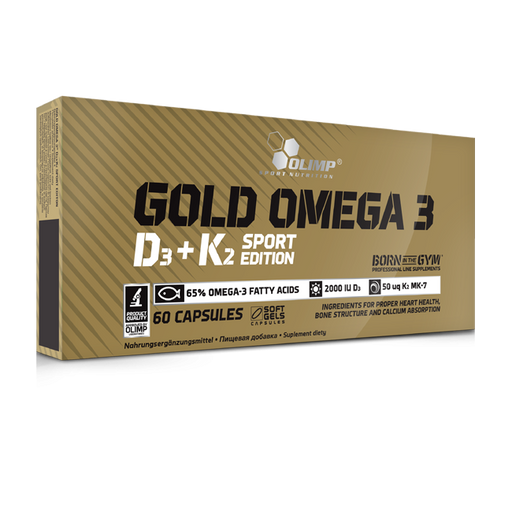 Save 0%
Save %
Original price €19,90 - Original price €19,90Original price €19,90€19,90€19,90 - €19,90Current price €19,90| /
Save 0%
Save %
Original price €19,90 - Original price €19,90Original price €19,90€19,90€19,90 - €19,90Current price €19,90| /Gold Omega 3 D3+K2 Sport Edition · 60 capsules
Olimp Sport Nutrition2 reviewsproductGold Omega 3 D3+K2 Sport Edition - rich food supplement with omega-3, vitamin D3 and K2. Omega-3: Obtained from cold-water fish, support...
View full detailsOriginal price €19,90 - Original price €19,90Original price €19,90€19,90€19,90 - €19,90Current price €19,90| /Save 0% Save % -
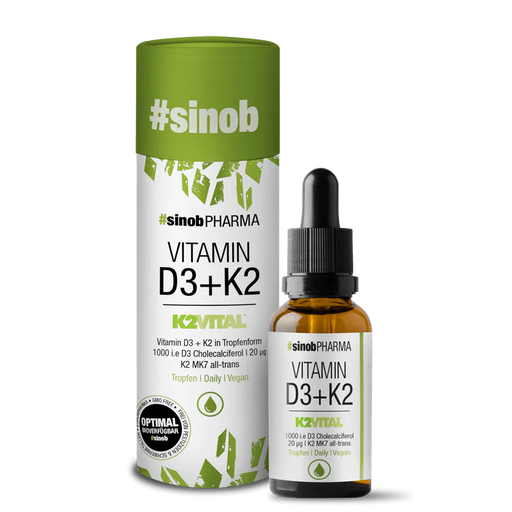 Save 0%
Save %
Original price €16,90 - Original price €16,90Original price €16,90€16,90€16,90 - €16,90Current price €16,90| /
Save 0%
Save %
Original price €16,90 - Original price €16,90Original price €16,90€16,90€16,90 - €16,90Current price €16,90| /Vitamin D3 + K2 drops · 10ml
#sinobNo reviewsVitamin D ImportanceEssential for bones, muscles, immune system. Vitamin D3 + K2 drops from #SINOB: Practical solution against vitamin D defici...
View full detailsOriginal price €16,90 - Original price €16,90Original price €16,90€16,90€16,90 - €16,90Current price €16,90| /Save 0% Save % -
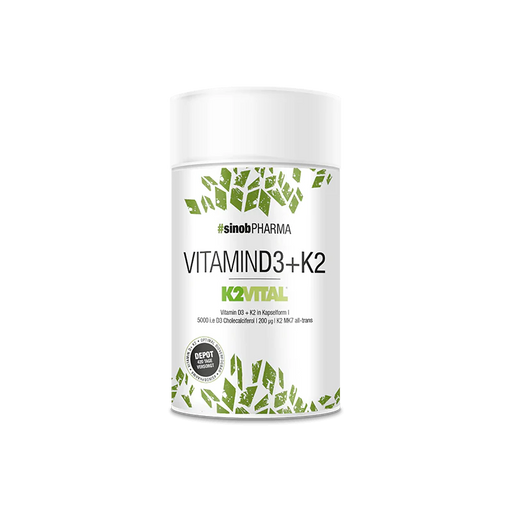 Save 0%
Save %
Original price €19,90 - Original price €19,90Original price €19,90€19,90€19,90 - €19,90Current price €19,90| /
Save 0%
Save %
Original price €19,90 - Original price €19,90Original price €19,90€19,90€19,90 - €19,90Current price €19,90| /Vitamin D3+K2 · 60 capsules
#sinobNo reviewsEssential vitaminsVitamin D3 and K2 are essential, fat-soluble vitamins. Sun synthesis: Vitamin D can be produced by the body itself if there i...
View full detailsOriginal price €19,90 - Original price €19,90Original price €19,90€19,90€19,90 - €19,90Current price €19,90| /Save 0% Save % -
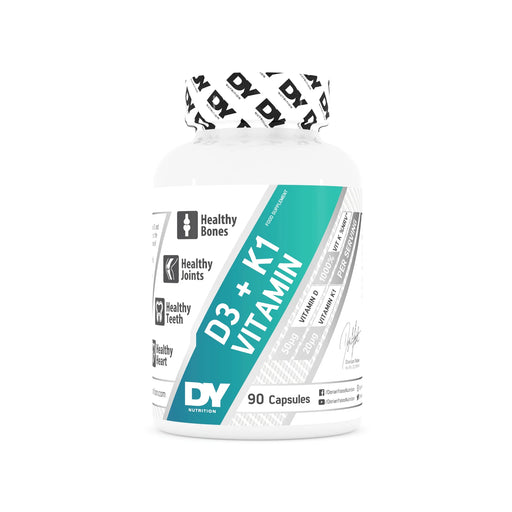 Save 0%
Save %
Original price €12,90 - Original price €12,90Original price €12,90€12,90€12,90 - €12,90Current price €12,90| /
Save 0%
Save %
Original price €12,90 - Original price €12,90Original price €12,90€12,90€12,90 - €12,90Current price €12,90| /Vitamin D3 + K1 · 90 capsules
DY NutritionNo reviewsVitamin D and K1 are crucial for a strong immune system and healthy bones. Increases bioavailability and absorption compared to food intake. Sup...
View full detailsOriginal price €12,90 - Original price €12,90Original price €12,90€12,90€12,90 - €12,90Current price €12,90| /Save 0% Save %
Vitamin D or calciferols is a collective term for various substances (steroids) that are actually hormones. They can be formed by the human organism from cholesterol in the skin through exposure to sunlight. Vitamin D3, or cholecalciferol, is the vitamin formed in the skin from cholesterol through exposure to sunlight. The plant-derived provitamin D, ergosterol, is also converted by photolysis in the skin. It is known as ergocalciferol or vitamin D2. Cholecalciferol and ergocalciferol have the same effectiveness.
The overall occurrence in food is very low. Most plant-based foods do not contain any prefabricated vitamin D. Mushrooms, spinach, some types of cabbage and yeast are an exception. There, ergocalciferol is present in relatively large quantities. In foods of animal origin, larger amounts of cholecalciferol are only found in fatty fish (salmon, trout, tuna, herring, etc.). Vitamin D is relatively heat-stable, which means that hardly any loss of this vitamin is to be expected when preparing (blanching or frying) vitamin D-containing foods. It is very unstable to oxygen and light. Long storage periods, especially in the light, reduce the bioavailability of the vitamin.
Metabolism
Vitamin D is mainly stored in the liver. There, and to some extent also in the kidneys and intestines, vitamin D3 is further converted into a substance (D hormone or calcitriol). This substance is responsible for regulating calcium metabolism.
Tasks
Vitamin D is a component of the endocrine system and is responsible for regulating calcium and phosphate metabolism. Vitamin D controls calcium resorption (absorption) from the intestine when the blood calcium level drops.
Receptors for calcitriol (D hormone; a vitamin D metabolite) are located in many tissues, such as the gonads, heart, pancreas and thyroid gland. However, it is still largely unknown what functions the hormone has there or how it influences these tissues.
Occurrence
Vitamin D is formed by UV radiation (sunlight!) from precursors (e.g. 7-dehydrocholesterol, ergosterol), the so-called provitamins. Only a few foods contain vitamin D. It is found in cod liver oil and oil, herring and egg yolk. Particularly rich sources of vitamin D (μg/100g)
- Sardine 7.05
- Herring 31
- Salmon 16
- Cod 1.3
- Liver (poultry) 1.3
- Liver (beef) 1.7
- Veal 3.8
- Cod liver oil 330
- Cod liver oil 210 10. egg 3.5
Plants contain ergosterol, while animal tissues contain 7-dehydrocholesterol. With sufficient exposure to UV light, both compounds can be converted into biologically active substances, which we summarize under the term vitamin D.
Health benefits of vitamin D
Vitamin D can prevent osteomalacia (bone softening) and promote bone health
Vitamin D maintains the balance of calcium and phosphorus in the body. More specifically, vitamin D promotes the absorption of potassium and phosphorus in the digestive tract, calcium reabsorption in the kidneys and calcium mobilization in the bones (1, 2, 3). Low vitamin D levels are associated with lower bone mineral density, insufficient bone mineralization and an increased risk of bone loss and fractures. Scientific research supports the role of vitamin D and calcium supplements in supporting bone health and reducing the risk of fractures (5, 6, 7, 8). Vitamin D deficiency can cause rickets in young children and osteomalacia (bone softening) in adults. Both can be prevented by an adequate intake of vitamin D in the diet (11, 12). To this end, an attempt should be made to achieve vitamin D blood levels in the range of 20 to 50 mg/nl (4).
Vitamin D can protect against osteoporosis
Together with calcium supplements, vitamin D supplements can help protect older adults from osteoporosis (9). In addition, oral vitamin D may prevent osteoporosis caused by corticosteroid medications prescribed to relieve severe inflammation. Research suggests that vitamin D metabolites such as calcitriol and alfacalcidol are most effective for this purpose (10).
Vitamin D can support the function of the immune system
Studies have shown that vitamin D has strong effects on both innate and adaptive immunity. Vitamin D has the potential to positively influence a wide range of imbalances in immune function, infections and autoimmune diseases (13, 14).cells such as macrophages, dendritic cells, T cells and B cells involved in the immune response have receptors for vitamin D (15, 16).
Here is an overview of some of the effects of vitamin D on the immune system:
- Regulates the activity of monocytes and macrophages (17, 18)
- Reduces the release of the pro-inflammatory cytokines IL-1, IL-2, IL-6, IL-8, IL-17, TNF-α, IFN-γ and IL-12 (19, 20, 21)
- Increases the release of the anti-inflammatory cytokines IL-10 and IL-4 (22, 23)
- Inhibits the production of IgE by B cells and increases the production of IL-10 by dendritic cells and T cells, which plays an important role in allergic immune reactions (24, 25)
- Reduces TFG-beta levels, which contributes to tissue repair (26, 27)
- Is crucial for the activation of T cells (28)
- Increases levels of CD8+ T cells, which is important for controlling viruses, bacteria and cancer (29, 30)
- Increases the amount of natural T-killer cells (31)
- Stimulates the release of antimicrobial compounds such as cathelicidin and beta-defensin 4 in response to infections (32, 33)
All of these findings suggest that vitamin D helps maintain a healthy immune response. It reduces pro-inflammatory messengers and increases levels of anti-inflammatory compounds.
Vitamin D can protect against respiratory infections
Scientists have found that people who suffer from vitamin D deficiency are more likely to develop respiratory and lung diseases, including tuberculosis. Limited research suggests that vitamin D supplementation may even prevent tuberculosis or reduce the duration of the disease by strengthening the immune system (34, 35, 36). A number of studies have also shown that vitamin D supplementation - especially during the winter months - protects children against influenza and respiratory infections. As far as adults are concerned, further studies are needed (37, 38, 39). In addition, people with HIV often suffer from vitamin D deficiency, which can further weaken their immune response. Some evidence suggests that supplementation can safely improve the immune function and vitamin D status of these patients (40, 41, 42).
Vitamin D can reduce inflammation and autoimmune diseases
Vitamin D helps to reduce inflammation in the body. Studies have shown that it can balance immune function. Vitamin D has the potential to positively influence a wide range of immune problems, infections and autoimmune diseases (43, 44). The potential of vitamin D to increase levels of regulatory T cells may be particularly important, as regulatory T cells are immune cells that prevent the immune system from going out of control. These cells can prevent allergic reactions as well as autoimmune tendencies (45).
So far, some studies indicate promising effects of vitamin D in the following inflammatory and/or autoimmune diseases:
- Multiple sclerosis (46, 47)
- Thyroid problems (48, 49)
- Lupus (50, 51)
- Rheumatoid arthritis (52)
- Irritable bowel syndrome (53, 54)
- Chronic obstructive pulmonary disease (55, 56)
- Type 1 diabetes (57, 58)
- Asthma (59, 60)
All in all, studies have confirmed that vitamin D deficiency is more common in people suffering from autoimmune diseases, inflammatory diseases and allergic problems.
Vitamin D can help combat low calcium levels in kidney disease
Oral vitamin D supplementation can effectively control low calcium levels and prevent complications such as renal osteodystrophy in people suffering from chronic kidney failure and undergoing dialysis (61).
Vitamin D could help with psoriasis
Creams applied to the skin that contain specific forms of vitamin D (such as calcitriol and other analogs such as calcipotriene, maxacalcitol and paricalcitolar) may help with psoriasis (62, 62).
Vitamin D could have a positive effect on dental health
Both vitamin D2 and vitamin D3 could reduce the risk of tooth decay, although vitamin D3 is likely to be more effective. Both were compared with a placebo in a clinical analysis in babies, children and teenagers (64). In older people, oral vitamin D3 supplementation appears to reduce the risk of tooth loss according to one study (65).
Vitamin D could have a positive effect on heart health
Limited data suggest that vitamin D may reduce the risk of heart disease in some women. Early research also highlights that heart patients have lower vitamin D levels (66).
Vitamin D could reduce the risk of cancer
Some studies have concluded that sufficiently high vitamin D levels may protect against some types of cancer and reduce the risk of death. Vitamin D may help prevent cancer by boosting the immune response, but the cancer-protective effects of vitamin D are still under investigation (67). For example, some studies suggest that women who get more sun and eat more foods rich in vitamin D have a lower risk of developing breast cancer, while other studies have found no such association (68, 69, 70, 71). According to some studies, maintaining higher blood levels of vitamin D could also help prevent colorectal cancer. On the other hand, vitamin D deficiency could increase the risk of prostate cancer. However, further studies are needed before definitive conclusions can be drawn (72, 73).
Studies investigating the effects of vitamin D on ovarian cancer have produced mixed results. Thus, it is still unclear whether vitamin D can help prevent pancreatic cancer or ovarian cancer, although early studies suggest that it may (74, 75, 76). Normal vitamin D levels appear to be important for cancer prevention, but more studies are needed to further investigate this link.
Vitamin D could reduce the risk of type 2 diabetes
Studies show that vitamin D supplementation has the potential to restore insulin secretion in specific cases (77, 78). However, the study results are mixed. There is evidence that vitamin D supplementation may only be beneficial in people who are at increased risk of diabetes and are vitamin D deficient. In a study conducted in women, taking 511 IU of vitamin D or more per day was associated with a lower risk of type 2 diabetes (79). Vitamin D may play a role in delaying progression to type 2 diabetes in adults at increased risk of diabetes. In one study, vitamin D supplementation was associated with good pancreatic cell function. It also reduced an increase in HbA1C - a marker of blood glucose levels over several months - over time (80).
Vitamin D can have a positive effect on sleep and brain health and development
Normal vitamin D levels support emotional balance, cognitive function and sleep quality (81, 82, 83). In addition, vitamin D is important for brain development, which is why pregnant women are recommended to consume at least 600 IU of vitamin D per day. Babies and children up to 12 months need 400 IU per day. In addition, vitamin D deficiency has been linked to a wide range of psychiatric and neurological disorders (84, 85). According to some researchers, low blood levels of vitamin D are associated with low mood, memory problems, and dementia (86, 87, 88). Some research suggests that normal vitamin D levels may protect against Parkinson's disease, although solid evidence is still lacking (89, 90).
Vitamin D could improve fitness
Clinical research suggests that vitamin D plays a role in muscle metabolism and function (91). Vitamin D could strengthen muscles and improve fitness. Vitamin D deficiency may make athletes more susceptible to injury according to some studies (92, 93, 94). Studies also suggest that vitamin D can increase the physical strength of upper and lower body limbs (95).
Vitamin D could help with obesity and metabolic problems
Vitamin D helps the pancreas produce insulin, which controls blood sugar levels. A deficiency could impair this process and is common in type 2 diabetics (96, 97, 98). Several studies have also found a link between low vitamin D levels and obesity. Studies suggest that higher blood levels of vitamin D may protect against obesity and metabolic syndrome (99, 100, 101).
Vitamin D can support reproductive health
Vitamin D deficiency during pregnancy can harm both mother and child. It can lead to bone loss and osteomalacia (softening of the bones) in the mother and impair growth, bone formation and tooth enamel formation in newborns (102, 103). Most experts consider vitamin D doses of up to 4,000 IU to be safe during pregnancy. Vitamin D may also support fertility and reproductive health in men. Limited studies suggest that vitamin D may improve sperm motility, but these results are not conclusive at this time (104, 105). Data on the effects of vitamin D on fertility in women are scarce. Limited research suggests that vitamin D may help women suffering from polycystic ovary syndrome, which impairs ovulation and fertility. However, further, larger-scale studies are needed (106, 107).
Vitamin D can support skin and hair health
Vitamin D helps to reduce inflammation in the body. Maintaining healthy vitamin D levels could help support skin and hair health. Some scientists believe that people with skin problems such as eczema, psoriasis and hair loss should be monitored for vitamin D deficiency. However, more research is needed to support this practice (108).
Limited research suggests that vitamin D is promising for the following:
- Eczema (109)
- Acne (110)
- Wound healing (111)
- Autoimmune hair loss (112)
Limitations
It is important to note that many studies conducted on vitamin D are correlational studies, meaning that a vitamin D deficiency correlates with a particular problem, but this does not mean that the deficiency is the cause of the problem. In many cases, the actual cause of the health problems is that the people concerned are not getting enough sun, rather than a vitamin D deficiency. Scientific research suggests that the sun has many health benefits that are independent of vitamin C. In this case, a vitamin D deficiency is often a sign that the person is not getting enough sun, which could be the root cause of the problem.
Symptoms of deficiency
Vitamin D deficiency reduces the absorption capacity of calcium. This in turn lowers the concentration of calcium in the blood. This calcium deficiency has an unfavorable effect on bone structure in children and adolescents. The bones are insufficiently supplied with the stabilizing mineral, which leads to deformation of the skeleton (legs and spine) and reduced bone strength. This corresponds to the clinical picture of rickets. The low blood calcium level can also lead to cramps and changes in nerve resilience. In adults, vitamin D deficiency can lead to decalcification of the skeleton and disorders of the muscle nerves. The decalcification of the skeleton manifests itself in bone deformation and spontaneous bone fractures. It often leads to osteoporosis and even bone loss.
Hypervitaminosis
Like vitamin A, vitamin D also has very good storage properties and is only excreted in relatively small quantities. This quickly leads to damage to the body in the event of an overdose of vitamin D. Symptoms of hypervitaminosis D are
- Nausea
- vomiting
- thirst
- muscle weakness
- Excessive calcium excretion via the urine
- increased urine volume
Requirements
Vitamin D requirements and intake recommendations are not as simple as for other vitamins. In principle, the body produces enough vitamin D to supply itself with sufficient sunlight. At the same time, the need for this vitamin varies depending on many factors. Health, age and the calcium and phosphorus content of the diet play a decisive role. The DEG (German Nutrition Society) recommends a daily intake of 0.005 mg with food for adults and children after the age of twelve months. For children under twelve months, expectant mothers and breastfeeding mothers, the vitamin D requirement is slightly higher, which is why an additional intake of 0.01mg vitamin D per day is recommended.
Requirements in sport
Corticosteroids, e.g. cortisone and prednisone, which are often used in sport to treat injuries, deplete the body's own stores of vitamin D3. Long-term use of corticosteroids can therefore lead to a loss of bone mass. My recommendation is to take 200-400I.U. a day with a meal.
Interactions
Corticosteroids, e.g. cortisone and prednisone, which are often used in sports to treat injuries, deplete the body's own stores of vitamin D3. Long-term use of corticosteroids can therefore lead to a loss of bone mass.
Supplement types of vitamin D
There are two forms of vitamin D: vitamin D2 and vitamin D3. Vitamin D2 (ergocalciferol) is primarily produced synthetically and added to foods, while vitamin D3 (cholecalciferol) is produced by the skin and is found in animal foods (113). Vitamin D3 is approximately 87% more effective than vitamin D2 in increasing and maintaining vitamin D levels in the body. This form is therefore preferable for supplements (114, 115).
Dosage
The official recommendation for vitamin D is as follows (116):
- Children up to 12 months: 400 IU per day
- Children, adolescents and adults up to 70 years: 600 IU per day (including pregnant and breastfeeding women)
- People over 70 years: 800 IU per day
As vitamin D is a fat-soluble vitamin, it is better absorbed when taken with fat. Bile salts help with the absorption of vitamin D in the digestive tract. Disorders of the digestive system, blocked flow of bile acid and bile acid-binding drugs reduce vitamin D absorption (117, 118)
References
- http://press.endocrine.org/doi/10.1210/endo.141.4.7403?url_ver=Z39.88-2003&rfr_id=ori:rid:crossref.org&rfr_dat=cr_pub%3dpubmed](http://press.endocrine.org/doi/10.1210/endo.141.4.7403?url_ver=Z39.88-2003&rfr_id=ori:rid:crossref.org&rfr_dat=cr_pub%3Dpubmed)
- https://www.ncbi.nlm.nih.gov/pmc/articles/PMC389047/pdf/pnas00079-0112.pdf
- http://ajcn.nutrition.org/content/80/6/1689S.long#F3
- http://pediatrics.aappublications.org/content/122/5/1142.long
- https://www.ncbi.nlm.nih.gov/pubmed/18088161
- https://www.ncbi.nlm.nih.gov/pubmed/11493580/
- https://www.ncbi.nlm.nih.gov/pmc/articles/PMC2730873/
- https://www.ncbi.nlm.nih.gov/pmc/articles/PMC4020510/
- https://ods.od.nih.gov/factsheets/VitaminD-HealthProfessional/#h2
- https://www.nap.edu/read/5776/chapter/1
- http://pediatrics.aappublications.org/content/118/5/2226
- https://www.ncbi.nlm.nih.gov/pubmed/16085158
- https://www.cambridge.org/core/journals/proceedings-of-the-nutrition-society/article/vitamin-d-and-immune-function-an-overview/302152110AEE222430F44164E53FEA90/core-reader
- https://www.ncbi.nlm.nih.gov/pmc/articles/PMC2678245/
- https://www.ncbi.nlm.nih.gov/pmc/articles/PMC3166406/
- https://www.ncbi.nlm.nih.gov/pubmed/18594491
- http://science.sciencemag.org/content/224/4656/1438
- http://www.jimmunol.org/content/164/9/4443.abstract?ijkey=98883a693fbfdeffd5d662e7af47ad6a0f1c2275&keytype2=tf_ipsecsha
- https://www.ncbi.nlm.nih.gov/pmc/articles/PMC508562/
- https://www.ncbi.nlm.nih.gov/pubmed/8389732?dopt=Abstract
- https://www.ncbi.nlm.nih.gov/pubmed/26268060
- https://www.ncbi.nlm.nih.gov/pmc/articles/PMC4425186/
- https://bmcimmunol.biomedcentral.com/articles/10.1186/s12865-014-0035-2
- https://www.ncbi.nlm.nih.gov/pmc/articles/PMC3166406/
- https://www.ncbi.nlm.nih.gov/pubmed/18651709
- https://www.nature.com/ki/journal/v80/n10/fig_tab/ki2011265f1.html
- https://www.ncbi.nlm.nih.gov/pubmed/11592788
- https://www.sciencedaily.com/releases/2010/03/100307215534.htm
- https://bmcimmunol.biomedcentral.com/articles/10.1186/1471-2172-15-6
- http://jn.nutrition.org/content/144/12/2073.long
- https://www.ncbi.nlm.nih.gov/pubmed/21996367
- https://www.ncbi.nlm.nih.gov/pubmed/12464945/
- https://www.ncbi.nlm.nih.gov/pubmed/16497887/
- https://ije.oxfordjournals.org/content/37/1/113.long
- http://www.atsjournals.org/doi/abs/10.1164/ajrccm/138.4.768?url_ver=Z39.88-2003&rfr_id=ori:rid:crossref.org&rfr_dat=cr_pub%3dpubmed#.WA5xc_l96t8
- https://www.ncbi.nlm.nih.gov/pubmed/18245055?dopt=Abstract
- https://www.ncbi.nlm.nih.gov/pmc/articles/PMC3447082/
- https://www.ncbi.nlm.nih.gov/pubmed/15562899/
- http://ajcn.nutrition.org/content/91/5/1255.long
- https://www.ncbi.nlm.nih.gov/pubmed/21522006/
- https://www.ncbi.nlm.nih.gov/pmc/articles/PMC3110671/
- https://www.ncbi.nlm.nih.gov/pmc/articles/PMC3717313/
- https://www.cambridge.org/core/journals/proceedings-of-the-nutrition-society/article/vitamin-d-and-immune-function-an-overview/302152110AEE222430F44164E53FEA90/core-reader
- https://www.ncbi.nlm.nih.gov/pmc/articles/PMC2678245/
- https://www.ncbi.nlm.nih.gov/pubmed/20148422
- https://www.ncbi.nlm.nih.gov/pubmed/18701572/
- https://www.ncbi.nlm.nih.gov/pubmed/20494325
- https://www.ncbi.nlm.nih.gov/pmc/articles/PMC4133032/
- https://www.ncbi.nlm.nih.gov/pmc/articles/PMC3993051/
- https://www.ncbi.nlm.nih.gov/pmc/articles/PMC3149865/
- https://www.ncbi.nlm.nih.gov/pubmed/16431339/
- https://link.springer.com/article/10.1007%2Fs10067-012-2080-7
- https://www.ncbi.nlm.nih.gov/pubmed/15306569/
- https://www.ncbi.nlm.nih.gov/pmc/articles/PMC2731177/
- http://thorax.bmj.com/content/65/3/215.long
- http://thorax.bmj.com/content/69/1/24
- http://press.endocrine.org/doi/10.1210/endo-119-1-84?url_ver=Z39.88-2003&rfr_id=ori:rid:crossref.org&rfr_dat=cr_pub%3dpubmed
- https://link.springer.com/article/10.1007%2Fs00125-005-1802-7
- https://www.ncbi.nlm.nih.gov/pubmed/17919705/
- https://www.ncbi.nlm.nih.gov/pmc/articles/PMC2675563/
- https://www.ncbi.nlm.nih.gov/pubmed/12386263?dopt=Abstract
- https://www.ncbi.nlm.nih.gov/pubmed/22387034
- https://www.ncbi.nlm.nih.gov/pubmed/22013980
- https://www.ncbi.nlm.nih.gov/pubmed/23356636?dopt=Abstract
- https://www.ncbi.nlm.nih.gov/pubmed/11690570?dopt=Abstract
- https://www.ncbi.nlm.nih.gov/pubmed/25057156?dopt=Abstract
- https://www.ncbi.nlm.nih.gov/pmc/articles/PMC1470481/
- http://cebp.aacrjournals.org/content/8/5/399.long
- https://www.ncbi.nlm.nih.gov/pubmed/18590821/
- https://www.ncbi.nlm.nih.gov/pubmed/17368188
- https://carcin.oxfordjournals.org/content/29/1/93.long
- https://www.ncbi.nlm.nih.gov/pmc/articles/PMC1470481/
- https://www.ncbi.nlm.nih.gov/pubmed/2572900/
- https://www.ncbi.nlm.nih.gov/pubmed/2241107/
- https://www.ncbi.nlm.nih.gov/pubmed/11384870
- https://www.ncbi.nlm.nih.gov/pubmed/23700865
- http://press.endocrine.org/doi/10.1210/endo-119-1-84?url_ver=Z39.88003&rfr_id=ori:rid:crossref.org&rfr_dat=cr_pub%3dpubmed
- https://www.ncbi.nlm.nih.gov/pubmed/6376069?dopt=Abstract
- http://care.diabetesjournals.org/content/28/12/2926.long
- https://www.ncbi.nlm.nih.gov/pmc/articles/PMC3142723/
- https://www.ncbi.nlm.nih.gov/pubmed/17138809/
- https://www.ncbi.nlm.nih.gov/pmc/articles/PMC2730978/
- https://www.ncbi.nlm.nih.gov/pubmed/20595420/
- https://www.ncbi.nlm.nih.gov/pubmed/19500914/
- https://www.ncbi.nlm.nih.gov/pubmed/25033060
- https://www.ncbi.nlm.nih.gov/pmc/articles/PMC2730978/
- https://www.ncbi.nlm.nih.gov/pubmed/17258168/
- https://www.ncbi.nlm.nih.gov/pubmed/7560696/
- https://www.ncbi.nlm.nih.gov/pubmed/17230473/
- https://www.ncbi.nlm.nih.gov/pmc/articles/PMC3091074/
- http://press.endocrine.org/doi/10.1210/en.2003-0502?url_ver=Z39.88-2003&rfr_id=ori:rid:crossref.org&rfr_dat=cr_pub%3dpubmed
- https://www.ncbi.nlm.nih.gov/pmc/articles/PMC2901845/
- https://www.ncbi.nlm.nih.gov/pmc/articles/PMC4427016/#
- http://press.endocrine.org/doi/10.1210/jc.2008-1284?url_ver=Z39.88-2003&rfr_id=ori:rid:crossref.org&rfr_dat=cr_pub%3dpubmed
- https://www.ncbi.nlm.nih.gov/pubmed/25156880
- http://ajcn.nutrition.org/content/79/5/820.long
- https://www.ncbi.nlm.nih.gov/pubmed/3516771?dopt=Abstract
- https://www.ncbi.nlm.nih.gov/pubmed/18496468
- http://care.diabetesjournals.org/content/28/5/1228
- https://www.ncbi.nlm.nih.gov/pubmed/9624222?access_num=9624222&link_type=MED&dopt=Abstract
- http://journals.plos.org/plosone/article?id=10.1371/journal.pone.0089721
- https://www.ncbi.nlm.nih.gov/pubmed/21543150
- https://www.ncbi.nlm.nih.gov/pubmed/19522996
- https://humrep.oxfordjournals.org/content/26/6/1307.long
- https://www.ncbi.nlm.nih.gov/pubmed/2723823?dopt=Abstract
- http://www.fertstert.org/article/S0015-0282(15)00826-2/abstract
- https://www.ncbi.nlm.nih.gov/pubmed/22982716?access_num=22982716&link_type=MED&dopt=Abstract
- https://www.ncbi.nlm.nih.gov/pubmed/28994020
- https://www.ncbi.nlm.nih.gov/pubmed/27061361
- https://www.ncbi.nlm.nih.gov/pmc/articles/PMC4642156/
- https://www.ncbi.nlm.nih.gov/pmc/articles/PMC4642156/
- https://www.ncbi.nlm.nih.gov/pmc/articles/PMC5007917/
- https://www.ncbi.nlm.nih.gov/books/NBK56061/
- http://press.endocrine.org/doi/full/10.1210/jc.2012-4287
- https://www.cambridge.org/core/journals/british-journal-of-nutrition/article/long-term-vitamin-d3-supplementation-is-more-effective-than-vitamin-d2-in-maintaining-serum-25-hydroxyvitamin-d-status-over-the-winter-months/A6CD4FE5C649E0FAC9BCBAFB23538707
- https://ods.od.nih.gov/factsheets/VitaminD-HealthProfessional/
- http://press.endocrine.org/doi/10.1210/jc.2004-1629?url_ver=Z39.88-2003&rfr_id=ori:rid:crossref.org&rfr_dat=cr_pub%3dpubmed
- https://www.ncbi.nlm.nih.gov/pmc/articles/PMC3805278/












